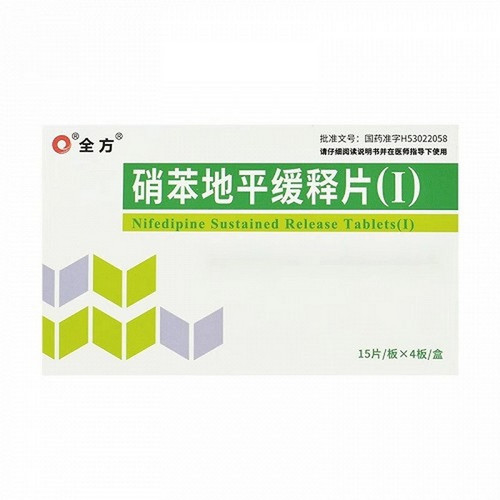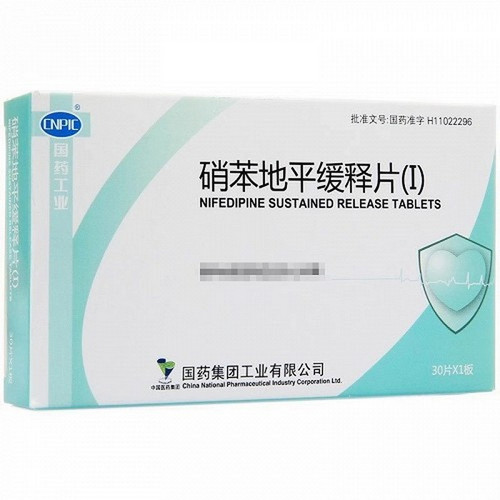Product Overview
[Drug Name]
Generic Name: Nifedipine Sustained-Release Tablets
Trade Name: Degaoning Nifedipine Sustained-Release Tablets (I) 10mg * 60 Tablets * 1 Bottle
Pinyin Full Code: DeGaoNing XiaoBenDiPingHuanShiPian (I) 10mg * 60 Tablets * 1 Bottle
[Main Ingredients]
Main Ingredients: The main ingredient of this product is nifedipine. Molecular Formula: C₁ₐH₁₈N₂O₆ Molecular Weight: 346.34
[Indications/Main Functions]
1. Hypertension (alone or in combination with other antihypertensive drugs). 2. Angina pectoris: especially variant angina.
[Specifications]
10mg * 60 tablets
[Dosage and Administration]
Oral: 10-20mg once, twice daily. Maximum dose: 40mg once, 0.12g daily.
[Adverse Reactions]
1. Liver: Occasionally, jaundice and elevated glutamate oxaloacetate aminotransferase and glutamate pyruvate aminotransferase levels may occur.
2. Circulatory System: Occasionally, chest pain, headache, flushing, dizziness, palpitations, decreased blood pressure, and lower limb edema may occur.
3. Allergies: Occasionally, allergic symptoms such as hives and itching may occur.
4. Digestive System: Occasionally, abdominal pain, nausea, loss of appetite, and constipation may occur.
5. Oral: Gingival hypertrophy may occur.
6. Metabolic Abnormalities: Occasionally, hyperglycemia may occur.
[Contraindications]
Contraindicated in patients allergic to nifedipine.
[Drug Interactions]
Unknown.
[Precautions]
1. When discontinuing calcium channel blockers, gradually reduce the dose. Do not discontinue medication without a doctor's advice.
2. Use with caution in patients with hypotension.
3. Use with caution in patients with severe aortic valve stenosis or hepatic or renal insufficiency.
[Pediatric Use]
Contraindicated in children.
[Elderly Use]
This study has not been conducted and no reliable references are available.
[Pharmacology and Toxicology]
Nifedipine is a dihydropyridine calcium antagonist that selectively inhibits transmembrane calcium transport into myocardial and smooth muscle cells and inhibits calcium release from intracellular stores without altering plasma calcium concentration. Pharmacological Action: This drug can dilate coronary arteries in both normal and ischemic territories, antagonizing spontaneous or ergonovine-induced coronary artery spasm, increasing myocardial oxygen delivery in patients with coronary artery spasm, and relieving and preventing coronary artery spasm. It can also inhibit myocardial contractility, reduce myocardial metabolism, and decrease myocardial oxygen consumption. Furthermore, it can dilate peripheral resistance vessels, lower peripheral resistance, reduce systolic and diastolic blood pressure, and reduce cardiac afterload. This drug can delay sinus node function and atrioventricular conduction in isolated hearts; electrophysiological studies in whole animals and humans have not shown that this drug delays atrioventricular conduction, prolongs sinus node recovery time, or slows sinus node reversal rate. Toxicological Effects: Carcinogenicity, Mutagenicity, and Reproductive Toxicity: No carcinogenicity. No mutagenicity. High doses can reduce female mouse fertility, cause malformations, and induce miscarriage (increased fetal drug absorption, increased fetal mortality, and decreased newborn survival). Pregnant monkeys administered 2/3 to 2 times the maximum human dose can develop small placentas and chorionic villus hypoplasia; and rats administered 3 times the maximum human dose can prolong pregnancy.









